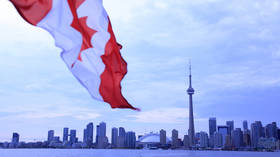Thousands of Canadian businesses could go bust – report

Thousands of small businesses in Canada face the risk of closing down after the government ended pandemic-era support last month and as interest rates are at a two-decade high, according to a Reuters report.
A surge in bankruptcies, which already jumped by 38% in the first 11 months of 2023, would weigh on the country’s economic growth, lobby groups and economists cited by Reuters warn.
Businesses that took out Canada Emergency Business Account (CEBA) interest-free loans of C$60,000 ($44,676), which were made available during the pandemic, had until January 18 to repay them. The repayment deadline has already been pushed back several times from its original date at the end of December 2022 to give small businesses more time to get on their feet.
Small businesses, which are the source of employment for almost two-thirds of Canada’s 12 million private-sector workers, are a critical segment of the country’s economy. Official statistics show there were about 1.2 million small businesses in Canada in 2021, contributing over a third to the country’s GDP. Canadian Finance Minister Chrystia Freeland said on Monday that of the 900,000 businesses that had taken the government support, a fifth have not yet repaid their loans. The Canadian Federation of Independent Businesses (CFIB) reportedly estimates that a quarter missed the deadline.
“There are tens of thousands, if not hundreds of thousands, of businesses that remain viable, but will not be able to outrun their debt,” CFIB president Dan Kelly told Reuters. Many debts could only be repaid by borrowing at a higher interest rate from banks, he said.
CFIB estimates that about 225,000 of those who repaid the federal loan took out a bank loan to do so at a time of skyrocketing interest rates. Those who missed the deadline now must make regular payments for two years at a 5% annual interest rate to pay it back in full.
“We do anticipate... a rise in insolvencies over the next six months or so,” Stephen Tapp, chief economist at the Chamber of Commerce, told the outlet. The Conference Board of Canada, an independent think tank, estimates first quarter corporate profits this year to nearly halve from a year ago as companies are hit with higher costs and a drop in sales. Economists expect consumer spending in the country on a per-capita basis to slump further.
For more stories on economy & finance visit RT’s business section













